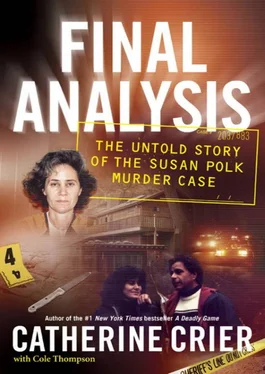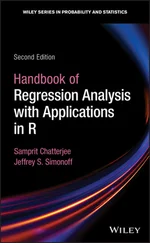“I object, your honor!” Susan announced, rising to her feet. Judge Brady admonished Susan that she was not permitted to object during the State’s opening remarks. But her words fell on deaf ears. In fact, Susan began interrupting the prosecutor at almost every turn. These interruptions set the tone for the entire trial. Throughout the proceedings, Judge Brady would attempt, often unsuccessfully, to control Susan’s flare-ups and accusations, including allegations that she and the prosecutor were colluding against the defendant.
Turning his attention back to the jury, Sequeria took a deep breath and once again tried to complete his opening remarks. The prosecutor described how Susan’s delusional behavior soon focused on Felix. She believed her husband was in the CIA, the FBI, and the Mossad. She believed he had offshore accounts in the Cayman Islands. Susan told her three sons that Felix “was a monster,” the prosecutor charged, triggering yet another objection from Susan.
“Felix was a therapist who couldn’t help his own wife with her paranoid delusions,” Sequeira continued amid more objections and yet another stern warning from Judge Brady.
“Until the murder, there was no extreme violence in the house,” the prosecutor went on. Citing the accounts of two of the Polk sons, the prosecutor argued that Felix was not the abuser and that both Felix and Susan provoked repeated confrontations in the household.
“Objection,” Susan yelled yet again.
“Mrs. Polk, I will not admonish you again,” Judge Brady warned angrily. The judge threatened to remove Susan from the courtroom if she interrupted one more time.
Jurors exchanged silent glances as the prosecutor continued.
“There was lots of grabbing and bumping but not extreme violence,” Sequeira said. “One time, Susan slapped Felix in front of a police officer. The boys will say that dad was an older guy and worked long hours. He came home late and tired and Susan would often verbally abuse Felix throughout dinner. Susan would challenge his manhood and poke fun at the size of his penis in front of the boys.”
“Objection!” Susan barked, seething with anger.
“I will remove you from this courtroom!” Judge Brady fumed, glaring at Susan.
For a moment, it appeared as though Susan would be barred from the proceeding. From Brady’s tone, it was clear that this would be her final warning—and Susan seemed to understand the gravity of the judge’s words.
From there, Sequeira continued his opening statement without interruption, weaving the complicated tale of the turbulent times in the Polk household. Painting a picture of dysfunction and psychological disturbance, the prosecutor detailed how Susan routinely belittled and emasculated the aging Felix. He walked jurors through Felix’s final days, detailing the brutal battle for custody of Gabriel and the fight over Susan’s alimony payments. To Sequeira, the Susan Polk who killed her husband was a cold, callous woman, not the victim she made herself out to be. She lied to the police about her involvement from the beginning, and she was still lying about her involvement as they sat there in the court.
“Susan then lies over and over and over and over at the police station,” he told the jurors as the defendant watched his every move. “Does Susan say ‘he came at me with a knife and I attacked him in self defense?’ No, she says she didn’t do it. But then forensic science kicks in and her lies are not permitted.
“She destroys evidence. Bloody clothes. Gone! Knife. Gone! Car—moved! Lies and a cover up!”
Jurors listened intently to the prosecutor’s theory. Sequeira detailed Felix’s injuries, informing them of the savage nature of his wounds and showing the jurors dramatic crime scene photos. Despite the graphic pictures, no one flinched.
“Ladies and gentlemen, the evidence will show the defendant was upset. This festered until she made good on a repeated threat” to kill Felix Polk, the prosecutor charged. “Dr. Polk, abuser or victim of the ultimate attack of murder?”
Following Sequeira’s opening remarks, jurors were dismissed for the night, but Susan wouldn’t leave without one parting shot at the court.
“I want a mistrial!” Susan demanded as the last juror stepped out of the courtroom. “It’s all lies,” she shouted furiously, ticking off each of the prosecutor’s statements. “Anyone who knows me knows I wouldn’t talk about my husband’s penis in front of the boys. It’s laughable.”
Judge Brady angrily directed Susan to move on to evidentiary issues that needed addressing, but Susan wouldn’t let things rest. She complained that her case assistant, Valerie Harris, was not being permitted to visit with her in jail and that she had still not received all of the case documents from Dan Horowitz.
Ignoring Susan, the judge turned to the prosecutor and instructed that he discuss the evidence with the defendant.
“Liar!” she shouted at the prosecutor.
“Lady, I know your act, and if you try to draw me in, and try to control me like you’re trying to control the court, then I’ll deal with Mrs. Harris,” Sequeira shot back.
“Then, I’ll fire Ms. Harris,” Susan said as she promptly terminated her only assistant.
When court recessed for the night, Susan rehired Harris; she was back at Susan’s side the following morning, watching intently as Susan interrogated her youngest son.
Chapter Twenty-four
THE CHIEF WITNESS
Susan’s attention was trained on the witness stand, where Gabriel Polk sat in a suit and tie, ready to testify for the prosecution. Now nineteen years old, the teen appeared composed and in control that Wednesday morning. It had been three years since Susan last saw her youngest son. Susan’s cross-examination of Gabe would mark the first time the two had spoken since Felix’s death. A restraining order had barred any contact between the mother and son during the intervening period, and Gabe had refused repeatedly to read any of Susan’s written correspondence.
Gabriel was the State’s strongest and most sympathetic witness. That Susan had allowed the then-fifteen-year-old youth to find his father’s dead body in the family’s guest cottage would be a major obstacle for jurors to overcome as they considered her explanation of self-defense. Sitting before the jury, Gabe’s once slender frame had filled out and what had been gaunt, sullen cheeks were now bright and healthy. He had grown into a handsome young man, with his mother’s strong jaw and deep-set eyes framed by thick, dark lashes.
Susan, dressed in black slacks and a blouse, appeared unsettled as she sat at the defense table. She blotted away tears with a tissue and sipped on a glass of water she poured from the gold and black carafe on the table. Saying that she felt ill, she took two Tylenol after getting permission from Sheriff’s deputies.
When asked by Sequeira to identify his mother, Gabe Polk looked in Susan’s direction and pointed. The two seemed to avoid direct eye contact. In response to questions from the prosecutor, Gabe described how he stopped attending school as a youth because his mother insisted that administrators were “out to get him” and were purposely giving him bad grades. Susan believed that his father was behind a conspiracy being perpetrated by members of the school faculty, that Felix had designated Adam for success and Gabe and his middle brother, Eli, for failure.
Jurors scribbled in notebooks as the teen responded to questions about Susan’s breakdown during the family’s visit to Disneyland. Gabe said he was nine or ten when the family made the trip and recalled his mother crying “uncontrollably.” Later he was told that while on the trip she had remembered being abused by her father, mother, and brother as a child, and that she believed her parents had murdered a police officer and buried his body in the basement of her childhood home. On the stand, Gabe recounted his mother’s recollections of the alleged abuse, which included “very disturbing details,” information he was ill-equipped to handle at the time.
Читать дальше











